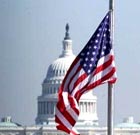| The US Congress has overwhelmingly approved a giant economic stimulus plan sought by the White House amid mounting fears that the world's biggest economy could be sliding into a recession. Senate and House of Representative lawmakers approved the economic aid package in separate votes, clearing the way for it to be signed into law by President George W. Bush. "The president will sign it next week," White House spokeswoman Cynthia Bergman told AFP. She said an exact date had not yet been announced. Bush has hailed the package amid a worsening housing market downturn and a dramatic slowdown in American economic growth. The stressed economy lost jobs last month for the first time in over four years and a Wall Street credit crunch, triggered in part by rising home foreclosures, has roiled global financial markets in recent months. "This plan is robust, broad-based, timely, and it will be effective. This bill will help to stimulate consumer spending and accelerate needed business investment," Bush said in a statement released Thursday by the White House. The plan is valued at around 150 billion dollars and crammed with temporary tax rebates and business incentives. Tens of millions of Americans are likely to receive tax rebate checks in their mailboxes in coming months after Bush gives the stimulus his official blessing. Treasury Secretary Henry Paulson also welcomed congressional approval of the package, saying it would inject money into a stressed economy. "This package of payments to individuals and incentives for businesses to invest will support our economy as we weather the housing downturn," the Treasury secretary said. Democratic and Republican senators had sparred over different incentives after the House of Representatives passed an initial version of the plan last Tuesday. The Democratic-controlled Senate approved an amended version of the House measure Thursday which senators changed to include tax rebates for low-income retirees and military veterans. House lawmakers met in an evening session to quickly approve the final amended package. The plan calls for tax rebate checks of up to 600 dollars for individual taxpayers and up to 1,200 dollars for couples, plus additional cash for dependent children. It also expands financing opportunities in the housing market by allowing Fannie Mae and Freddie Mac, two mortgage finance companies, to purchase or guarantee mortgages larger than 417,000 dollars up to 729,750 dollars. Lawmakers said it will not benefit wealthy Americans, as tax relief begins to phase out for individuals earning 75,000 dollars and for married couples with a combined income above 150,000 dollars. It will, however, provide "unprecedented" help to some 35 million families who work but make too little to pay taxes, they said. People who earned at least 3,000 dollars in 2007 are eligible for 300 dollars per individual or 600 dollars per couple, lawmakers said. Democrats and lawmakers from Bush's Republican Party applauded the plan. "Today's agreement is a victory for a better, more effective economic stimulus. Economists agree that consumer spending, fueled by tax rebates, can boost America's economy," said Democratic Senator Max Baucus. Republican Senator Mitch McConnell said:"This is not a victory for Republicans or Democrats. This is a victory for the American people." It's unclear, however, how much of a boost the vast package will give the troubled economy. Some economists have voiced doubt about whether the plan will deliver a needed shot-in-the-arm to growth. Its success will depend in part upon whether Americans spend their rebate checks and boost consumer spending or stuff them in bank accounts. Political concern about the economy has increased amid worries the country is on the cusp of a recession. The Federal Reserve has slashed interest rates since September in a bid to fire up economic momentum, which slowed significantly to a 0.6 percent annualized crawl during the fourth quarter of last year. Paulson said the government could start mailing out tax rebates to those eligible to receive them by early May. |





